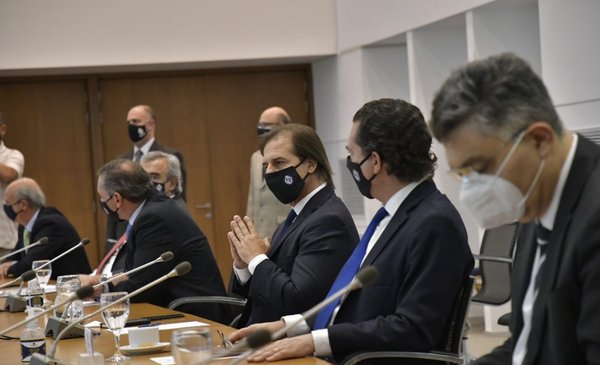The president, Luis Lacalle Pou, will meet this Wednesday with the Ministries of Economy, Livestock and Industry To define new measures that aim to mitigate the rise in prices of products of the basic basket, in a context of rising inflation worldwide.
A little over a week ago, the Executive Power resolved exempt from Value Added Tax (VAT), for a period of 30 days, the sale of roast. In addition, it was agreed with the producers to freeze the sale price of the eggs for a month and Permits were streamlined to allow greater entry of poultry meat from abroad to reduce its sale price to the public.
now enter the new proposals will be abolish VAT on oils, flours and derivativess, reported El País this Tuesday. These two products had major corrections in recent weeks that have had an impact on the domestic market.
This Monday the union of mills held a meeting with the Center of Industrial Bakers. There the industry ratified that it has a pending adjustment in the price of flour after the increase of 8% average materialized at the beginning of Marchbut what had been delayed pending the measures that the Executive Branch plans to announce this Wednesday.
“In that meeting they did not give us the certainty if indeed this adjustment was going to be set aside because they were waiting for the government’s announcements,” he explained to The Observer a source from the Bakery Industrial Center, who indicated that his union is not participating in the negotiation table with the Executive for the potential measures that may be announced for that chain in the coming hours.
This Tuesday, analysts raised their inflation projections to 7.9% for this year, according to the latest Inflation Expectations Survey (EEI) published by the Central Bank of Uruguay (BCU). In the previous edition, the median of those surveyed expected to close the year with a figure of 7.1%, eight tenths less. In the 12 months ending in February, inflation stood at 8.9%, far from the current official target range of 3% to 7%.
In addition, another issue on the agenda is to ensure the supply of fertilizers. Weeks ago, the MGAP had begun negotiations with Brazil so that local producers can access the purchase with the intermediation of the neighboring country. The operation would imply that they have to go to Brazil to look for the products, although later the private companies will also have to agree on their price.
Fuel adjustment is imminent
Leonardo Carreno
The rise in fuels will be defined this week.
Another issue that is on the table is what will happen to theas fuel tariffs in April, in a context where international oil prices have remained above US$ 100 a barrel after the start of the war between Ukraine and Russia.
The Ursea Board of Directors approved this Tuesday the monthly report on Import Parity Prices (PPI), which will be published on this day. That will be one of the inputs that the Executive Power will use, together with the monthly report from Ancap to make the decision between this Wednesday and tomorrow, Thursday. Attentive to the evolution of prices in the Gulf of Mexico in the US, this report will suggest adjustments in sales prices in the domestic market.
What do the numbers show? Ursea’s technical report indicates that the price of gasoline should have a variation of $7.54 per liter (+10.1%)with which the projected price at the pump for April would be $82.42 per liter, according to data accessed The Observer.
Meanwhile, in the case of diesel, the PPI report indicates that this fuel should rise $15.22 per liter (+28.2%), with which the value at the pump would go from $53.99 in March to $69.21 in April.
Executive Power sources told The Observer that the rates will have a correction but —as in previous months— it will be lower than what is indicated by the rule based on the evolution of international prices.
The Minister of Industry and Energy, Omar Paganini, said this Tuesday in declarations to Radio Universal that Ancap has “very little financial back” left to stop a new increase in rates to the publicas was done in previous months, freezing rates or adjusting below what the international market indicated.
Ancap proposed to the Executive Power an increase of $5 in gasoline and $10 in diesel in the price report that it raises monthly to the government, reported Montevideo News of City TV.
“We are going to evaluate it well, the idea is that perhaps we can have the rest for a little less than that (which Ancap proposes),” Paganini said. The chief added that “there is volatility and one does not have to transmit it directly to the market because it generates peaks that later distort everything, one tries to contain it,” he said.
“You have to see the margin that we really have and in the end that ends up being how much it costs and where it comes from and how much Ancap can support, it is a discussion with Economy, OPP and the president (Luis Lacalle Pou)”, he recalled.
In March, the Executive Branch increased fuel prices for the second consecutive time so far this year. On that occasion, while the technical report suggested adjustments of between 5% and 9%, the correction was partial and stood at 2%.
CPA Ferrere economist Gabriel Oddone wrote that under the current scenario, “if the government decides to comply with the rule it defined to set fuel prices, the probability that the planned disinflation is feasible is lower.”
“On the contrary, if the authorities prioritize the fulfillment of their inflationary commitments, they will have to continue making adjustments to the rates in a discretionary manner, delaying the increases. This means postponing increases, which will also affect the fiscal result in the short term”Oddone stated on his blog.







